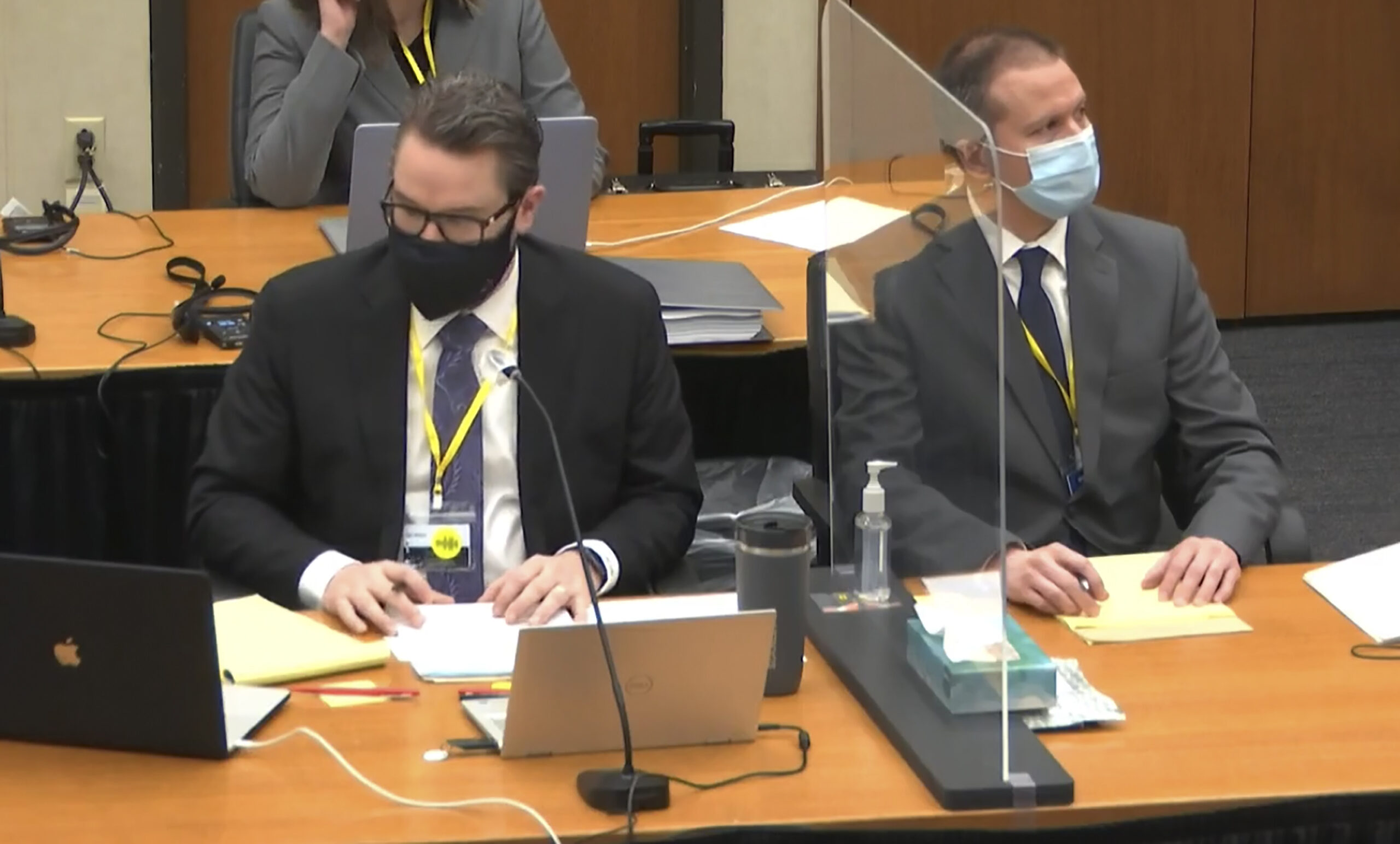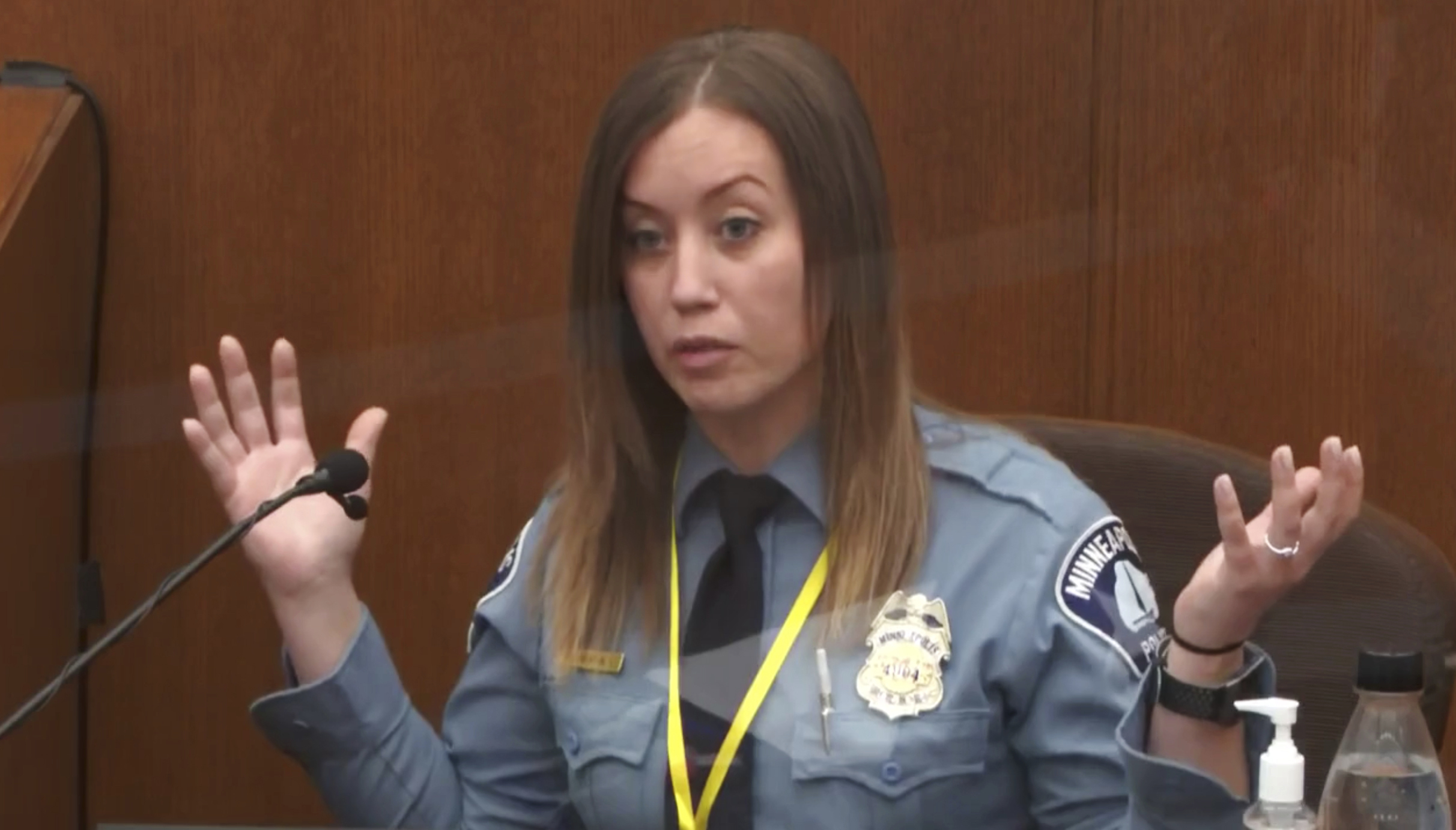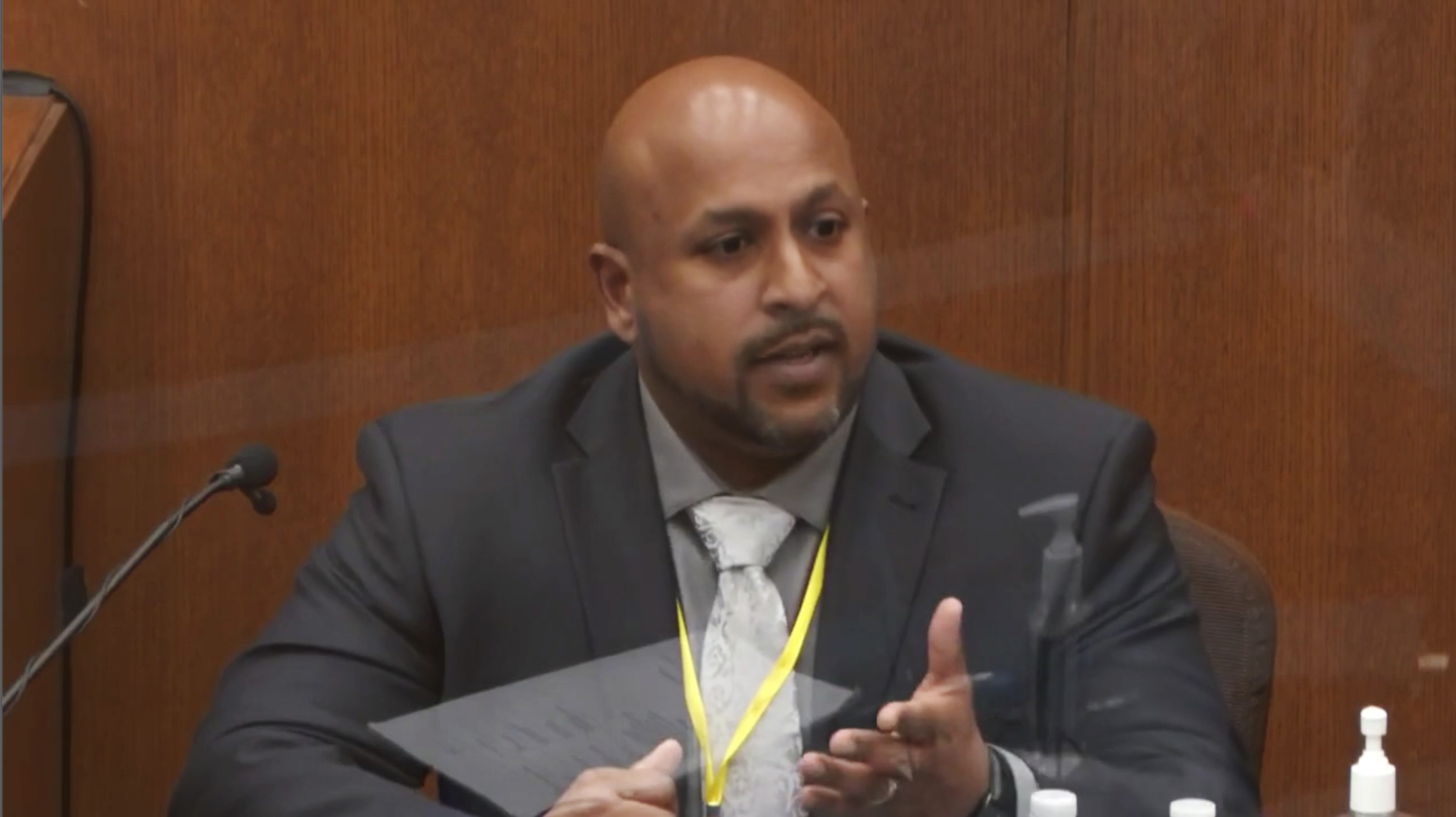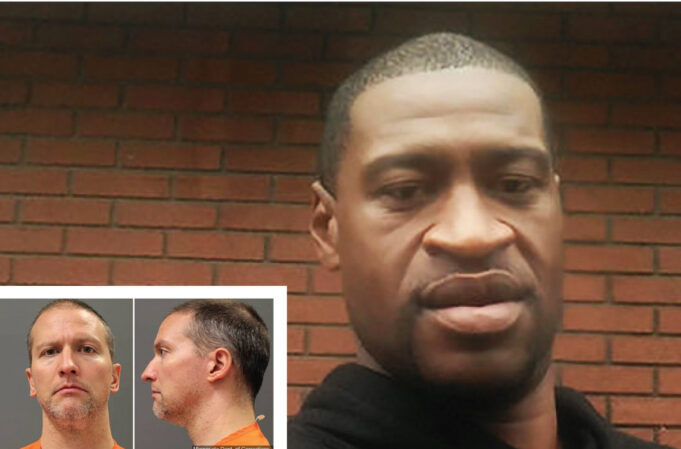More than a few close observers of court trials and those who’ve joined in to watch the criminal trial of former Minneapolis cop Derek Chauvin, accused of murdering George Floyd, have been angered by the efforts of defense attorneys to paint Mr. Floyd as a criminal and drug dealer who caused his own death.
Dr. Rashawn Ray said while it’s clear that defense lawyers are drawing on common stereotypes about Black bodies and the obvious biases in criminal justice, he believes that former Minneapolis police officer Derek Chauvin should be convicted.
“Well, I think it’s a few things to note: We’ve seen every law enforcement officer testify that what he did was unreasonable. It will have a huge sway on the jury,” said Dr. Ray, a professor of sociology at the University of Maryland, College Park. “They view officers as experts. It’s clear that the defense is using excited delirium as a cause of death, racial tropes to justify state-sanctioned murder by a police officer and talking about drugs and saying a knee was not on his neck.”
Dr. Ray, a David M. Rubenstein Fellow at The Brookings Institution, said even though there are things that should happen and even with videos and a range of witnesses across ages and profession, people are still not sure Chauvin—who is charged with second-degree murder, second-degree manslaughter and third-degree murder after kneeling on George Floyd’s neck for more than nine minutes while he was handcuffed and lying face down on the ground—will be convicted.
“A diverse jury means you’re more likely to get a conviction, but I don’t know what the jury is responding to, what they’re thinking about. The evidence should be overwhelming at this point. Having three charges helps. People would be upset if he gets manslaughter. With three charges I would hope one sticks,” he said.
The police-involved killing triggered widespread national and global protests and demonstrations demanding an end to state-sanctioned murders, police brutality and racial injustice and ignited a sustained, significant, and pervasive social justice movement.

D.C. journalist and commentator Jamila Bey said there’s a reason why in cases such as this the burden of proof determining guilt is so impossibly high and that despite clear video evidence and what people saw, the defense attorneys for Derek Chauvin continue to push a narrative not rooted in reality.
Ms. Bey—who said she can’t stomach watching the proceedings but has been reading the transcripts—said what the public is seeing is by design.
“I believe that the American criminal justice system is so broken that to expect it to work is to set yourself up for disappointment,” she told The Final Call. “We’ve seen all over the country open and shut cases, but nothing happened because the perpetrators were in blue. Qualified immunity is a powerful thing. I’m hard pressed to think of any of them in law enforcement who’ve served real time.”
Ms. Bey, a journalist, public speaker, and political commentator, said while it’s trendy for people to remind others that modern police departments are descended from slave patrols, the role that law enforcement plays in modern society goes much deeper.
“This wasn’t just about rounding up fugitives and bringing them back to the plantation. This was about maintaining order,” she said “Black people had to be terrorized to be controlled. Raping women, gang-rapes and brutality was to send a message to their family. Or they were raped for fun or because it was Wednesday. The ability of police officers to act with impunity against Black people was total.
“There’s ruling class and protectors of the ruling class. Cops are there to protect the elite,” Ms. Bey explained. “I’ve studied law and politics. I know what’s supposed to happen. But, why would I think that a Black man with a White woman who’s his girlfriend would ever get justice? The laws don’t apply when it’s a cop or when you’re Black. White America requires a subjugated Black nation. That happens with militarized police jacked up on steroids and departments infiltrated by card-carrying White supremacists.”
Ms. Bey said she believes that Chauvin will get a minimal sentence because if he’s convicted of murder, “to do so would indict all of law enforcement.” But she said she doesn’t think he will be acquitted either.

“To convict is to convict everywhere,” she said “That would require a restructuring that they don’t want to do. They got Al Capone on tax evasion. There are ways to get the people you want to go down. I think he will go down. Acquittal will mean more burning and the diminution of American standing in the world.
“There’s a lot riding on this for the nation and the structure of policing in the United States,” she said.
Houston attorney Athill Muhammad agreed with Ms. Bey and Dr. Ray.
“All they have to do is convince one or two jurors. It should not matter but I truly believe it will,” he said. “In my opinion, people will not focus on what the real issue is or what the facts are but will be swayed by saying he got what he deserved. Some will say Mr. Floyd had a criminal background as if to suggest that it justifies what happened to him.
“That is completely wrong. If a person gets hit in the street, that does not give someone the right to rob him,” attorney Muhammad said. Defense attorneys focusing on Mr. Floyd’s character and painting him as a criminal “pulls people’s attention away from the underlying and true issue.”
“Heck, the person has already paid his debt to society. Sometimes people look at it as ‘once a criminal, always a criminal,’” he said.

Although Eric Nelson, Mr. Chauvin’s attorney, has ensured that George Floyd’s character is on trial, testimony during the second week of the trial by noted pulmonologist Dr. Martin J. Tobin left court experts and others in the legal community searching for words to describe the effectiveness and thoroughness of his testimony.
Dr. Tobin fended off efforts by defense attorneys to paint him in a corner telling jurors in studied tones that Mr. Floyd died from strangulation of the windpipe and his inability to elevate his ribcage; because the victim’s being handcuffed prevented him from breathing; that Mr. Chauvin’s body and gear added more than 91 pounds of pressure on Mr. Floyd’s body; and that after Mr. Floyd’s last breath, Mr. Chauvin stayed with his knee on his neck for three more minutes.
Court observers say jurors were rapt as Dr. Tobin described the point that air left Floyd’s body for the last time.
Dr. Vin Gupta, a public health physician, professor, and health policy expert, said in interviews on MSNBC that Mr. Floyd suffered what he called PEA arrest because he was suffocated.
“Low oxygen is a common cause of that,” said the Harvard University-trained lung specialist. “He didn’t have a coronary occlusion—causing Vfib/Vtach, requiring an electrical shock. Cherry-picking medical data to cause confusion won’t change that reality.”
Dr. Gupta said brain damage generally sets in after a person is denied air for four minutes. Then the heart muscle stops pumping, and the person goes into cardiac arrest caused by oxygen deprivation.
“Mr. Floyd was trying to move his body to get air into his lungs because the knee narrowed his trachea,” said Dr. Tobin, a specialist with 50 years of experience. “With a knee in the neck, the body contorted and that closes off the ability to take a breath. He’s basically defenseless. He tried to move to open up one side of his lungs.”
He also made it clear that neither Fentanyl nor methamphetamines, heart disease or other physical ailments played a role in Mr. Floyd’s death.
“Strangulation of the windpipe and elevation of the ribcage or positional asphyxia. This is what caused George Floyd’s death,” Dr. Tobin said, a specialist in pulmonary and critical care medicine at the Loyola Medical Center in Chicago, Illinois, and a recognized expert in acute respiratory failure, mechanical ventilation, and neuromuscular control of breathing.
He also told the court that Mr. Floyd’s was breathing “close to double the respiratory rate at 22 while Fentanyl would have lessened breathing to 6 or less.”
Dr. Tobin’s said his assertions and conclusions came from watching sections of the video hundreds of times and also on very precise scientific knowledge such as the level of oxygen when someone loses consciousness. He said he calculated the exact amount of weight Mr. Chauvin pressed on Mr. Floyd’s neck, monitored his respiratory rate, and determined the moment that he took his last breath.
And with the aid of video stills, Dr. Tobin illustrated Mr. Floyd’s desperate attempts to free his upper body so he could breathe and trying to use his face, shoulder and fingertips to push back against Mr. Chauvin’s weight. He said an indicator of Mr. Floyd’s distress—because of the low amount of oxygen—was him kicking his legs, a sign that he had suffered brain injury five minutes and three seconds after Mr. Chauvin first placed his knee on his neck.
Yet despite such compelling testimony, we are constantly reminded that the burden of proof falls more heavily on the prosecution and that the defense has only to plant enough doubt to sway one juror to believe that the case hasn’t been proven “beyond a shadow of a doubt,” or if jurors cannot come to a unanimous verdict, that will result in a mistrial.
Forensic Pathologist Dr. Lindsey C. Thomas’ testimony was another layer that solidified that Mr. Chauvin killed Mr. Floyd by kneeling on him for more than nine minutes. Dr. Thomas said she has worked in a number of medical examiner’s offices over the past three decades and has performed as many as 5,000 autopsies.
“The activities of the law enforcement officers resulted in Mr. Floyd’s death, and specifically those activities were the subdual restraint, restraint and the neck compression,” she said. “…What I observed from all of these videos is this was not a sudden death, not like snow shoveling when someone clutches their chest and falls over. There was nothing sudden about his death.”
She later added: “There’s no evidence to suggest he would have died that night except for the interactions with law enforcement.”
Dr. Natasha Pratt-Harris, like Ms. Bey, said she has not watched the trial, even though this as a part of her work as a professor, addresses and works on suggested reforms, engages with law enforcement and the community and is supposed to make informed comment.
“(But) I haven’t done it. It’s not healthy. I have not been able to commit to hearing testimony from prosecutors or the defense. I haven’t been able to stomach or wrap my brain around details of the case as it presents itself in the courtroom,”
said Dr. Pratt-Harris, an associate professor and Criminal Justice Program coordinator at Morgan State University. “It’s actually traumatizing. I have vivid memories of one year ago. Very vivid memories of being home, like everyone else in this country and realizing that my then-17-year-old shared the video with my seven-year-old.”
“I was mortified that she showed it.”
With regards to conviction, Dr. Pratt-Harris said: “Because of what we’ve seen in the past, it wouldn’t be a surprise if he’s not convicted. It would be an amazing injustice, one that is clear and present if he is not convicted, but it would not give us a sigh of relief if he’s convicted.
“That one life would in some ways symbolize all that has been lost, so many lives lost and so many moments of injustice in our system. We know that we can’t make up with that in one case or one person. There would not be a sigh of relief just more disgust that we even have to go down this path to go to a point where an officer is initially prosecuted and brought to trial, but the victim and his background is on the table, as if it matters. …”
Attorney Muhammad is deeply steeped in the criminal justice system with 20 years of trial experience handling discrimination, police misconduct, criminal allegations, parole/probation violations cases as well as appeals and more. He said he doesn’t blame African Americans for hoping to secure justice from a system that rarely delivers as promised.
“I wouldn’t say people are foolish because we’re always hoping for some kind of justice. But what would be considered justice? Because the brother isn’t coming back to life,” he said. “I would say we should not pin our hopes on a conviction because if we do, and the two-word verdict comes down, then our hopes are dashed. If the outcome is not what we feared or wanted, we will be devastated and frustrated.”
Atty. Muhammad said he mentioned to a friend recently how this case could not even have gotten to this point.
“The bottom line is, suppose there was no independent video? We would not have been here now. It would have been the officer’s words versus those of the bystanders,” he said.
He said the problem is with policies whose focus is misplaced and he’s been explaining why to whoever will listen.
“We cannot continue to march and demonstrate. It has to be us going to state legislators who author those use of force provisions and the law enforcement curriculums,” attorney Muhammad said. “They have to be held to the point that they realize that they need to change and start scaling back the unfettered and discretionary use of lethal and/or excessive force.
“One of the things to me is that it’s your state legislator. I’m not saying register to vote and all that. But if we hold our city council representatives in various municipalities and cities responsible to change these curriculums and look at their voting records, we can publicize those votes and move to get them out of office.
When they come to our churches, mosques and civic organizations, we need to ask where they stood and what legislation they’ll create to change the law. If he/she votes against us, they won’t get our support.”













